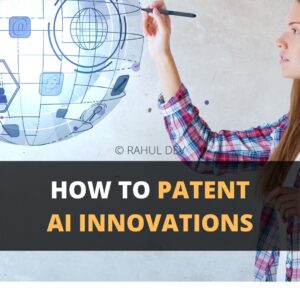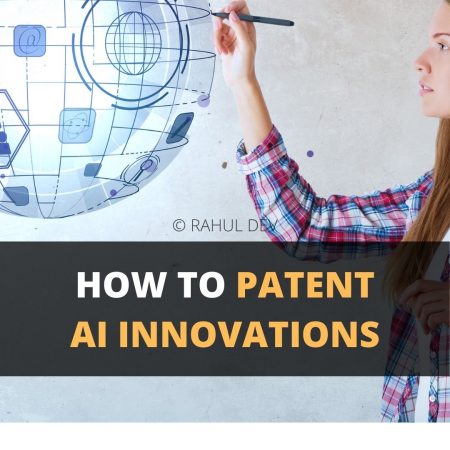Patent AI Innovations
Explore the Process to Protect AI Models via Patents

Understand Practical Aspects
Understand how to launch patented AI products

Explore the Process to Protect AI Models via Patents

Understand how to launch patented AI products

Protect your innovations across multiple countries and create strong patent portfolio to boost business valuation
Local and global brand protection through international trademark registrations
Extensive research and business writing for technical whitepapers and B2B content products
The growth of artificial intelligence (AI) technologies in recent years has transformed the AI business landscape, particularly in areas such as data analysis, data entry, data visualization, and real-time communication. Innovations and advancements in these domains are crucial for launching AI niche products and AI startups that aim to enhance operational efficiencies and decision-making capabilities. As a result, strategic AI innovations and AI patenting with effective technical documentation writing shape the success of niche AI products and AI startups. Here, I want to discuss the roles of AI innovation, AI technology transfer, AI patent searching, patent drafting for AI tools, and technical writing in developing and launching AI-driven tools. Drawing upon my extensive international consulting experience and current industry and academic insights, I highlight the unique aspects of these processes and their impact on the successful deployment of AI-enhanced tools.
This article covers following topics:
How to Patent AI Innovations for Niche AI Products
AI Technology Transfer and AI Innovation Commercialization
Strategic Patent Searching for AI Inventions
Rigorous Patent Drafting for AI Models
AI Technical Writing as a Tool for Clarity and Compliance

Organizations and pioneers in the rapidly evolving AI field should carefully evaluate the patenting of AI models as a complex and vital aspect of their intellectual property strategy. The patentability of artificial intelligence (AI) models is dependent on many legal and technological criteria relevant to each country, which pertain to the model’s ingenuity, practicality, and novelty.
For an AI model to be considered innovative, it must not be a pre-existing work that is publicly available. Furthermore, it is crucial that it demonstrates a certain level of non-obviousness; it should not be a commonplace or expected answer among experts in the relevant field. As per the 2021 recommendations issued by the European Patent Office (EPO) on AI and machine learning, AI models that demonstrate technical characteristics or address technical problems may qualify for patent registration. For instance, the utilization of predictive algorithms in an artificial intelligence model to improve the energy efficiency of data centers might be considered as both novel and non-obvious.
When it comes to answering how to patent AI models, DeepMind, a subsidiary of Google, is a good case study to consider, wherein Google has acquired patents for numerous cutting-edge AI models, including those utilized in AlphaGo, an artificial intelligence specifically developed for gaming purposes. The patents underscore the technical solutions provided by the artificial intelligence (AI), specifically pertaining to the enhancement of power management in data centers. This exemplifies the successful resolution of a technical issue, hence enhancing the non-obviousness of the applications. The AI model must also demonstrate a clear “technical effect.” This means it should offer a tangible technical solution or improvement over existing technologies. For example, AI models that enhance image processing speeds by reducing computational load could be seen as having a significant technical effect, which makes them eligible for securing AI patent rights. IBM’s Watson Health provides an excellent example of technical effect, where AI models are used to analyze unstructured data in health records to provide personalized treatment recommendations. This not only improves the efficiency of data processing but also contributes to better health management outcomes, aligning with patent criteria under U.S. and European patent laws for answering all queries pertaining to the frequently asked question, how to patent AI inventions.
Patent applications for AI models must include sufficient detail that another expert in the field can replicate the invention without undue experimentation. This is a critical requirement to prevent the patenting of abstract ideas without practical applicability. According to a World Intellectual Property Organization (WIPO) report on intellectual property and artificial intelligence, detailed disclosure is paramount. The report highlights that failing to provide explicit implementation details can lead to the rejection of patent applications, as seen in some cases where generic claims about AI were not backed by specific algorithmic processes or system capabilities. Innovators should aim to clearly demonstrate the novelty, non-obviousness, and technical contribution of their AI models, ensuring detailed and sufficient disclosure in their patent applications. Engaging with case studies of successful patents and adhering to best practices, such as those from IBM and Google, can provide valuable insights into navigating the complexities of AI patents effectively. Furthermore, staying informed with ongoing regulatory developments is crucial to align patent strategies with broader legal and ethical standards.
Innovation, particularly in the AI sector, is not merely about technological advancement but also about creating significant competitive advantages. For niche products like multilingual data analysis tools or AI-powered data visualization platforms, innovation enables the differentiation that is crucial in today’s saturated markets. Academic literature often emphasizes the role of disruptive innovation in creating new market spaces (Christensen, 1997). For instance, leveraging cutting-edge natural language processing algorithms can transform a standard data analysis tool into a multilingual powerhouse, opening up markets that require regional language processing capabilities. This not only demonstrates my commitment to leveraging global technological trends but also showcases an understanding of market-specific needs.
Technology transfer is vital in translating research insights into commercially viable products. In my role as a consultant, facilitating the transfer of AI technologies from academic labs to the market has involved navigating complex networks of stakeholders, including universities, private companies, and regulatory bodies. Industry reports suggest that effective AI technology transfer includes AI patent licensing, which has proven essential in protecting intellectual property while fostering collaboration (AUTM Report, 2020). For startups focused on AI-assisted data entry tool implementation, securing technology through patents can safeguard their innovations and attract venture capital.
Patent searching is more than a legal necessity; it is a strategic tool that informs the R&D direction. For AI-powered data visualization and cleaning tools, a thorough patent search can reveal gaps in the market, allowing for the strategic positioning of a startup’s offerings. My approach integrates an exhaustive analysis of existing patents to avoid infringement risks and to identify opportunities for innovation. This practice is supported by findings from the World Intellectual Property Organization (WIPO), which highlight the importance of patent landscapes in emerging technologies (WIPO Report, 2019).
The expertise in patent drafting is crucial in securing a startup’s intellectual assets. Detailed and strategically crafted patent applications are essential to protect the unique aspects of AI technologies, such as algorithms and their applications in business settings. My experience has shown that robust patent protection while addressing how to patent AI models is critical for startups to fend off competition and to negotiate collaborations and licensing agreements. Industry guidelines, such as those from the European Patent Office (EPO), offer frameworks that ensure the comprehensiveness and enforceability of patents.
Finally, technical writing plays a pivotal role in communicating complex AI tool functionalities to stakeholders, including investors, regulatory bodies, and potential customers. Clear, concise, and compliant documentation is essential, not only for regulatory approvals but also for user adoption. In crafting documents for startups specializing in enhancing virtual events with real-time language translation, my focus has been on aligning technical descriptions with user expectations and regulatory standards, which is often cited as a best practice in technical communication journals. In conclusion, the integration of these elements, innovation, technology transfer, strategic patenting, and effective communication forms the backbone of launching successful AI-driven tools in today’s competitive environment. Drawing on my global consulting experience and supported by academic and industry insights, this note outlines how each component contributes to the overarching goal of transforming innovative ideas into market-ready solutions that advance business capabilities.

As a business coach and thought leader, I cannot emphasize enough the importance of innovation, new software patents, mobile apps, and patents for tech companies, startups, and entrepreneurs. The world is rapidly evolving, and staying ahead of the curve is vital for success. Embracing technological advancements such as blockchain and AI can unlock unprecedented opportunities, streamline operations, and propel businesses into the future with competitive valuation via intangible assets.
Click Here for AI Startup Valuation Guide.
For instance, blockchain technology can revolutionize supply chain management and secure data sharing wherein innovative business models are explained to the audience via technical whitepapers, while AI can automate and optimize decision-making processes. Mobile apps are no longer just a luxury; they have become essential tools for engaging customers and offering personalized experiences. Furthermore, securing digital innovation patents is crucial for protecting intellectual property, fostering innovation, and maintaining a competitive edge. By investing in these areas, businesses can position themselves as industry pioneers and pave the way for a prosperous future after thoroughly conducting the due diligence and reviewing the legal opinion letters, which in case of digital assets can assist in determining the tokens as utility assets or coins as utility tokens before listing the assets at an exchange.
Our team of advanced patent attorneys assists clients with patent searches, drafting patent applications, and patent (intellectual property) agreements, including licensing and non-disclosure agreements. Advocate Rahul Dev is a Patent Attorney & International Business Lawyer practicing Technology, Intellectual Property & Corporate Laws. He is reachable at rd (at) patentbusinesslawyer (dot) com & @rdpatentlawyer on Twitter.
Quoted in and contributed to 50+ national & international publications (Bloomberg, FirstPost, SwissInfo, Outlook Money, Yahoo News, Times of India, Economic Times, Business Standard, Quartz, Global Legal Post, International Bar Association, LawAsia, BioSpectrum Asia, Digital News Asia, e27, Leaders Speak, Entrepreneur India, VCCircle, AutoTech).
Regularly invited to speak at international & national platforms (conferences, TV channels, seminars, corporate trainings, government workshops) on technology, patents, business strategy, legal developments, leadership & management.
Working closely with patent attorneys along with international law firms with significant experience with lawyers in Asia Pacific providing services to clients in US and Europe. Flagship services include international patent and trademark filings, patent services in India and global patent consulting services.
Global Blockchain Lawyers (www.GlobalBlockchainLawyers.com) is a digital platform to discuss legal issues, latest technology and legal developments, and applicable laws in the dynamic field of Digital Currency, Blockchain, Bitcoin, Cryptocurrency and raising capital through the sale of tokens or coins (ICO or Initial Coin Offerings).
Blockchain ecosystem in India is evolving at a rapid pace and a proactive legal approach is required by blockchain lawyers in India to understand the complex nature of applicable laws and regulations.